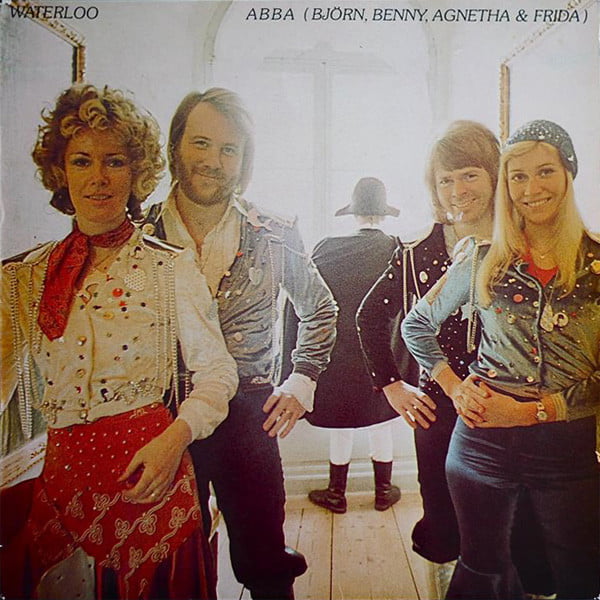
ABBA: Waterloo cover
Its title track stands as a pop masterpiece, and the ratio of killer to filler has improved, but ABBA: Waterloo is still as preposterous as it is pleasing… By Wyndham Wallace
ABBA may have been connoisseurs of outstanding melodies, but their lyrics – despite input from manager Stig Anderson, a prolific songwriter himself – sometimes left something to be desired.
Their second album is a goldmine of linguistic misdemeanours, with evidence right off the bat: Waterloo may begin with that thrillingly simple, instantly recognisable riff, but those opening lyrics – “My My/ At Waterloo Napoleon did surrender/ Oh yeah/ And I have met my destiny in quite a similar way” – are written in a peculiar hybrid of archaic and second-language English that can’t help but make visions of people singing along that little bit more ridiculous.
Matters don’t improve as the album proceeds: the wild rhymes of King Kong Song (“What a dreadful mighty killer/ A big black wild gorilla”); the clumsily rebellious vernacular of My Mama Said (“Ooh, my mama said, ‘Look at this, you haven’t done your bed’”); and the downright creepy, romantic pigheadedness of Watch Out (“Anywhere you go I’ll find you/ Watch out/ I’ll be staying close behind you”).
That’s not to mention Sitting In The Palmtree, which concerns a gentleman roosting with the coconuts while monitoring his true love’s window – always a controversial seduction method – and the charmingly literal What About Livingstone, which uses the explorer’s deeds to justify space travel.
But then there’s the title track. Sure, Waterloo seems to dwell, as a number of ABBA’s songs do, on now (hopefully) outmoded relationship structures – in this case a woman forced to concede to the strength of her conquering man’s feelings – but there’s an irrefutable joy in that mid-chorus couplet (“So how could I ever refuse?/ I feel like I win when I lose”) that perfectly matches the song’s breathless, racing pace.
No wonder it propelled them to international fame: having passed on Ring Ring for 1973’s Eurovision Song Contest in favour of Nova And The Dolls – who finished a poor 12th – Sweden selected ABBA the following year, and Waterloo secured the prize.
Read more: ABBA Albums – The Complete Guide
Read more: Top 40 ABBA songs
Nonetheless, Waterloo the album presents a band that aren’t quite playing to their strengths, and who haven’t wholly identified their sound. This is clear from the moment the faux calypso sounds of Sitting In The Palmtree get underway: though it’s blessed with their trademark hooks and so sprightly it’s almost weightless, the air of novelty holiday hit that envelopes it is impossible to ignore.
One could also level the ‘gimmick’ accusation at King Kong Song – once known as Mr. Sex, this glam-pop number, with what sound like ape impersonations in the chorus, is less Alice Cooper and more Rocky Horror – and at Hasta Mañana, the tune the group rejected for Eurovision in favour of Waterloo).
Fortunately, the album then delivers three slices of near perfection. My Mama Said may be lyrically laughable – how can anyone not snigger at “My mama said, ‘I know you’ve been out again with Fred’”? – but Janne Schaffer’s jazzy guitar, and some wonderfully funky basslines, make this a precursor to the disco sound they’d explore more fully later.
Dance (While The Music Still Goes On) pushes the oddly lisping males to the front, but a glorious melancholy emerges each time the ladies get to the mic, and that hackneyed key change merely prolongs the pleasure. Honey Honey, meanwhile – the album’s second single – is so sweet and close to pastiche it could have been recorded by a Japanese tribute girl group.
Whether these are compensation for the rock histrionics of stalker anthem Watch Out – another Rocky Horror moment – and the unduly saccharine schlager of What About Livingstone? is questionable.
Either way, they’re easily forgotten, because the album’s finale is so remarkable: Gonna Sing You My Lovesong, a heartfelt if morally questionable plea for a man to abandon his partner in favour of the song’s protagonist, boasts a defiantly uplifting chorus, while Suzy-Hang-Around – a rich, harpsichord-fuelled, baroque pop gem that’s so different to the rest of the album it could almost be Big Star – brings things to an unexpectedly psychedelic close.
Its lyrics may focus bizarrely on the cruel rejection by older boys of a young girl in a school playground, but – as we’ve by now established – who’s here for the words? We’re here for the sentiment, and ABBA were getting closer and ever better at capturing and articulating that.
Enjoy this article on ABBA: Waterloo? Then check out our feature on debut album Ring Ring
Read more: Making ABBA’s The Visitors
Check out ABBA’s official website here
Classic Pop may earn commission from the links on this page, but we only feature products we think you will enjoy.


